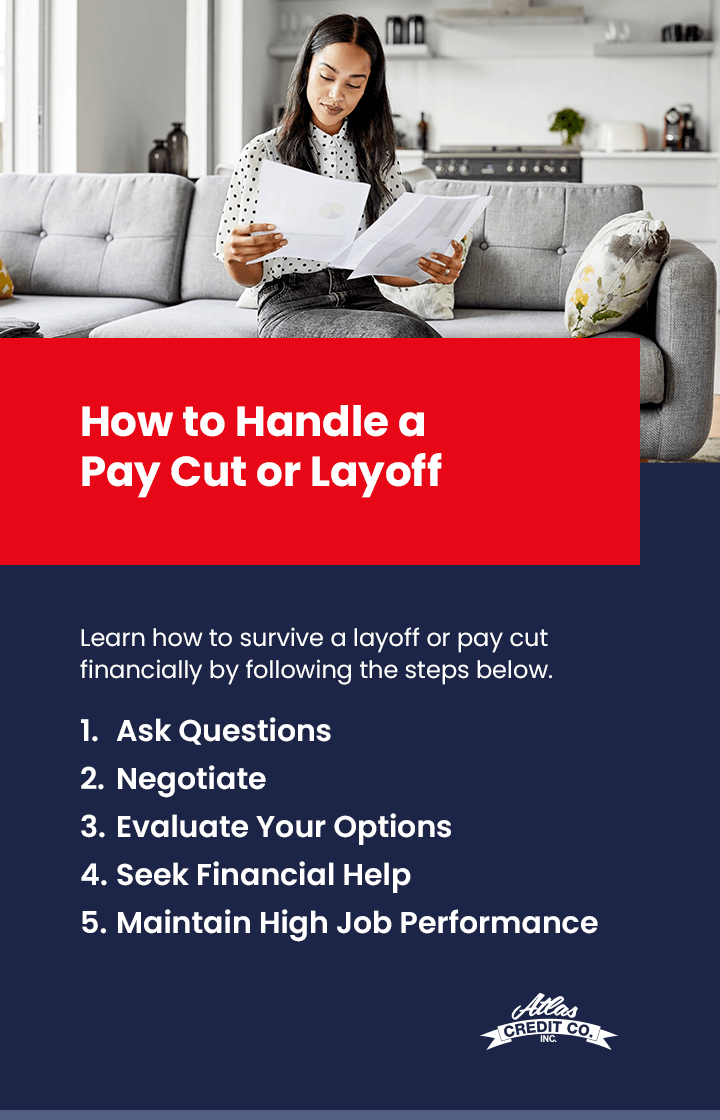
No one wants to discover that after dedicating years of hard work to their employers, they're suddenly being demoted or even put out of a job. However, if you identify with either situation, you're not alone. According to studies, one in three full-time workers suffered pay cuts over the last year, and while employment rates are lower than they were in 2020, they're still higher than pre-pandemic numbers.
That's why you should never let a sudden job loss catch you completely off-guard. Yes, sometimes a company you work for may notify employees ahead of time about potential layoffs, giving employees time to process and find new work. But other times, the job you had simply won't exist when you get to work in the morning.
Preparing for a layoff or pay cut can be challenging, as many workers quickly learned over the last year. But it's not the end of the world — especially if you're well-prepared. If you're unsure how to survive unemployment financially, you can incorporate many tactics into your lifestyle to get back on your feet. After losing your job, here's how you can come out on top.
What Is a Pay Cut?
A pay cut is a decrease in an individual's compensation at their place of employment. This demotion isn't limited to monetary pay — it could also refer to a change in hours or benefits. While pay cuts are completely legal and can reduce your salary by any amount, significant pay cuts may justify quitting and qualifying for unemployment benefits.
Note that pay cuts may not legally lower a worker's hourly pay below the federal minimum wage of $7.25 per hour.

What Is a Layoff?
A layoff involves terminating or suspending a worker from their job for reasons not related to their performance. When a worker is laid off, they may experience temporary or permanent separation from their position. This isn't the same as being fired, as firing typically results from worker wrongdoing, inefficiency, or breach of duty. Often, a worker will be laid off when the company can't afford to keep them on any longer.
Different Case Scenarios for Pay Cuts
Though pay cuts and layoffs may be widespread in recent years, every situation varies by company. There are five primary types of demotions that may result from an economic downturn, each of which has different outcomes. These scenarios include:
1. Pay Cuts
Though pay cuts aren't something companies take lightly, they still happen. If you receive a pay cut under extreme circumstances, such as a failing company or an economic recession, you may not be able to do anything about it. While negotiations are certainly possible, your employer may not agree to them, depending on the situation.
2. Furloughs
Not every pay cut is a direct salary reduction. Sometimes, companies require their employees to work fewer hours or take a leave of absence until conditions improve, also known as a furlough. This leave typically occurs when an employer doesn't have enough money for payroll or there's not enough work for employees. A furloughed worker may even have to take unpaid hours, days, or vacations throughout the year.
3. Benefits
Instead of cutting your pay, an employer may decide to reduce some of your benefits. These benefits range from soft to hard, depending on the severity of the circumstances. Examples of benefits you may see affected during pay cuts include:
- 401(k) retirement plan
- Tuition reimbursement
- Medical benefits
- Travel opportunities
- Complimentary food and beverages
4. Bonuses and Raises
If you regularly receive bonuses or annual raises from your place of employment, your company may eliminate them during pay cuts. Additionally, they may reduce other salary increases, such as cost-of-living and merit raises.
When a business commits to bonuses they can no longer pay, they lose their credibility with employees. If that's the case for you, you may want to consider finding a new job.
5. Layoffs
Getting laid off means losing your employment with a company through no fault of your own. Often, companies lay off their employees when restructuring or downsizing their organizations or consolidating businesses or assets through a merger or acquisition. Sometimes, a layoff means your position is no longer needed within the company.
These situations can either be temporary or permanent. Be sure to talk to your employer to discuss which status applies to you.
How to Handle a Pay Cut or Layoff

If you've recently experienced a pay cut or layoff and don't know what to do next, you're not alone. Millions of others have found themselves in the same situation before. Luckily, they made it through the struggle, and so can you. Learn how to survive a layoff or pay cut financially by following the steps below.
1. Ask Questions
Taking a pay cut or layoff can be overwhelming. If you recently received the news, you likely have many questions — and you have the right to get answers. Don't hesitate to ask your employer what's going to happen with your job or salary so you can know what to expect.
Some standard questions you can ask about your employment situation include:
- Why is this happening? It's helpful to find out why your employer is cutting your pay or laying you off. Depending on the reason, you may be able to negotiate your salary or adjust your performance.
- When will these changes take effect? Knowing when your pay cut or layoff will apply is essential in preparing financially.
- Who else is being impacted? If you find that your entire team is receiving pay cuts, it may be an indication that your company is struggling and planning for layoffs later.
- Is this change temporary? Determine whether your pay cut or layoff is temporary and will reverse in the future or the changes will affect you permanently.
- Will this affect only my salary? It's wise to inquire whether only your salary is taking a hit or you can expect other aspects like your benefits to be cut.
- Will health care costs increase? A layoff or pay reduction may also impact your health care coverage.
- How will this affect my work? If you're taking a pay cut, be sure to ask whether your hours or responsibilities will change as a result. There may be different workload expectations to prepare for in the coming weeks.
- What is the company doing to improve? Organizations implementing company-wide layoffs are likely having a hard time keeping their doors open. If that's the case, you should ask what measures they're taking to secure the company's future and, in turn, yours.
2. Negotiate
Every employer is aware that with pay cuts and layoffs comes a surge of workers putting in their two weeks. If you're planning to stay with your company, you may be able to negotiate for better terms in lieu of your reduced salary — your employer may see the benefit of accommodating your requests over losing you as an employee.
There are various aspects of your job you may be able to negotiate in the wake of pay cuts:
- Vacation: There could be a way to cash in on nonmonetary benefits by asking for an extra week or two of vacation to compensate for salary reductions.
- Bonuses: Some employers will offer a retention bonus that awards staff members a gratuity if they sign a contract agreeing to stay with the company for a certain amount of time.
- Hours: Sometimes, your employer will allow you to change your hours after taking a pay cut. For example, they may agree to a four-day workweek with 10-hour shifts or even fewer work hours.
- Remote opportunities: If it's possible for you to work from home, your employer may grant you the choice to work remotely for one or two days a week.
- Responsibilities: It's unreasonable to considerably reduce a worker's salary and expect them to continue taking on the same responsibilities under the same job title. If that's the case for you, you may be able to negotiate your workload and duties.
- Retroactive pay: This pay is money added to a worker's paycheck to compensate for shortfalls in a previous pay period. It may be possible to negotiate a salary increase or retroactive pay based on your proven value, or how much you're worth according to your contributions to the company.
3. Evaluate Your Options
Though it may feel like you're at the mercy of your employer, you'll find that's not always the case. There's nothing that says you have to accept a pay cut or layoff, especially if you weren't particularly happy at your job in the first place. It's solely your choice to determine when to take a pay cut versus when to leave your employer by assessing your situation.
Don't be afraid to start looking for new jobs that will pay more than your current employer. Ultimately, a pay cut now may indicate a layoff later, and a layoff now may mean you won't get your job back later on. Before you start applying for new positions, do some research on your industry.
If your company seems to be among the only ones failing, you have the green light to look for a different employer. If many organizations across your field appear to be struggling, you may want to consider getting involved in a different industry. Assess the situation to ensure you know where to look for employment.
4. Seek Financial Help
Of course, money can get tight in the event of a layoff or pay reduction. If you find you find yourself in an unfavorable financial position, you should start making some changes.
Try dipping into your resources for relief. For example, your service providers or landlord may be more lenient by allowing you to delay a few months' worth of payments. Depending on your circumstances, you may also be eligible to receive financial assistance through government programs. These organizations may be able to lend food, health care, or cash assistance.
If you've been laid off, sign up for unemployment benefits immediately while you look for a new job.
5. Maintain High Job Performance
In the midst of pay cuts, it's easy to lose the motivation to continue delivering the quality of work you did previously. Though taking a salary reduction may be discouraging, you should do your best to keep up your work ethic and maintain a positive attitude. By proving your value and maintaining your unique skills, you'll be more likely to get a new position with a similar salary.
How to Manage Your Money in Uncertain Financial Situations
Creating a budget is a crucial measure when preparing for a layoff or salary reduction. It's vital to conserve money when you get laid off or receive a pay cut so that you can maintain your financial future. Take advantage of the following money management strategies to stay in good financial standing during unemployment.
Create a Budget
Using a budget to manage your spending is an excellent way to handle a recent pay cut or layoff. Whether you're creating a new budget or adjusting an old one, you can optimize your plan to meet your current needs:
- Add up your income: If you have a partner, combine your new salary with their current pay. Then, factor in any additional income you may have, like savings account interest or dividends from investments.
- List your expenses: Tally up your current costs, including essential expenses like housing, transportation, food, and clothing, and nonessential expenses, such as entertainment and hobbies. Use your bank statement to identify your expenses. Remember to account for irregular costs like gifts, home repairs, and car maintenance.
- Note your savings: If you have any regular savings habits, such as putting money into an emergency fund or retirement account, be sure to track them.
- Discuss the essentials: Talk to your partner to determine each of your needs and what parts of the budget are negotiable.
Cut Down Costs
If your expenses exceed what your new income allows, it's essential to cut back on your spending. Minimize your expenses with the following tips:
- Avoid large discretionary expenses like cars, vacations, and entertainment- and hobby-related spending.
- Cut back on restaurant visits and takeout meals.
- Seek out forbearance options with your utility provider.
- Reduce electricity use.
- Reevaluate your monthly subscriptions.
- Refinance for lower mortgage payments and interest rates.
- Adjust your thermostat.

Set Savings Goals
Though you may have just enough money to maintain your lifestyle now, unexpected events can occur that may leave you short during a financial emergency. Whether you're preparing for a layoff or reevaluating your finances following a pay cut, it's vital to put money away to give yourself something to fall back on in the event of hardships.
Here are some tips for saving your money when you get laid off:
- Put money into your savings the moment you get paid.
- Schedule automatic transfers from your checking account to your savings.
- Move three to six months' worth of expenses into an emergency fund.
- Start a retirement fund.
- Set an attainable savings goal, such as 3% of your paycheck per month.
Bring in Extra Income
It's possible to increase your earnings by exploring other sources of income in addition to your current job. First, you may qualify for unemployment benefits based on why you received a pay cut or layoff. If not, you may be able to earn extra money with a second job.
A side gig doesn't have to cost you much time or energy — anything that puts some extra cash in your pocket will do. Taking on additional jobs provides you with increased financial security and cash flow. If you're looking to pick up a new gig to make some extra cash, consider:
- Freelancing in your current field.
- Offering tutoring services.
- Driving for a ride-hailing app.
- Participating in paid surveys.
- Selling unwanted items online.
- Renting a spare room in your house.
- Selling handmade items.
- Offering cleaning services.
Look Into Your Benefits
If you lose your job, you may also lose your health insurance, so you need to come up with a plan B. While getting a new job is certainly your main focus, unexpected health issues could set you back even further. You may be able to get coverage through COBRA, your spouse or a health insurance state marketplace.
You should also check on what happens to your retirement plan when you leave. While tapping into it may not be the best strategy, as you will pay hefty tax penalties, you may be able to roll it over into another account. Do your own research or contact a financial advisor to find all of your options.
Looking Toward the Future
After you've gotten over the initial confusion, sadness, worry, and even anger about the layoff or pay cut you experienced, it's time to take action. Successful people are tenacious — they get back on the horse and start riding again, even after getting hurt. Here's how you can learn from your experience and find a new path forward.
Think of This as an Opportunity
No one wants to lose their job. But if you were unhappy in your role or had planned to leave the industry anyway, this may be a blessing in disguise. You can finally explore a new career field and perhaps find the path you were meant to walk in the first place.
Visit a career counselor or take an online assessment to see what kinds of jobs line up with your skills. Consider going back to school to find your real calling. Many people find successful second, third or fourth careers, no matter how old or young they are, because they have been laid off or let go.
Take a Proactive Approach
There is a reason the early bird catches the worm. The more proactive you are, and the faster you apply for jobs and pursue opportunities, the more likely you are to land a new job. You may have to go out of your comfort zone by cold-calling companies you want to work for and jumping on job boards. But the harder you push, the more likely it is that you will be rewarded.
Protect Your Mental Health
Losing a job can be hard on you emotionally. You may feel vulnerable, upset and confused. So what to do when you lose your job? Open up to your friends and family about your feelings, and seek support so you don't fall into the doldrums. Everyone loses a job sooner or later. It doesn't reflect on your value as a person, as those you love can tell you. Don't tie your self-worth to your work.
Network Like There's No Tomorrow
Remember all those friends from high school, college, previous jobs, or even in your neighborhood? Some of them might know a place where you can find work. Reach out to them as soon as possible for information about potential jobs, and put in applications wherever possible.
If you are at all savvy on social media platforms, perhaps you have heard of or used LinkedIn in the past. LinkedIn is all about networking and will allow you to make connections with others in your area or your previous industries. By connecting with and reaching out to these people, you may find yourself in a far better position than the one you occupied at your last job.
If You're Laid Off and Need Money, Atlas Credit Can Help
If you've experienced a pay cut or got laid off and need money, Atlas Credit is your solution. We provide access to small loans for customers with credit scores ranging from low to high. We keep the process simple and transparent to give customers the most stress-free experience. Our team makes all credit decisions with fast turnaround times, so you won't have to wait.
Apply for a loan today!



